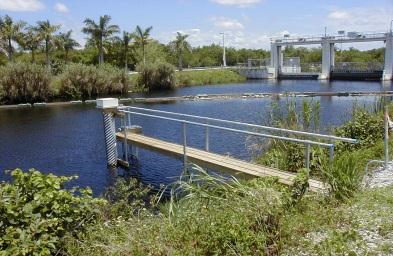BFA Environmental, (aka Barnes, Ferland and Associates Inc.) was retained by the South Florida Water Management District (SFWMD) to provide professional services in improvement and uncertainty analysis of index-velocity ratings. This work is directly related and significantly overlaps with similar efforts USACE, Jacksonville District range of hydrology and hydraulic services.
The SFWMD is responsible for managing and protecting the water resources of South Florida, including the Everglades, the Kissimmee River and its floodplain, Lake Okeechobee and South Florida’s coastal estuaries. For flow monitoring purposes, the SFWMD maintains and operates over thirty index-velocity sites that are instrumented with Doppler-type acoustic index-velocity meters. These index-velocity sites are located upstream of tidally affected spillways, uncontrolled culverts, and open-channel inland stations, where other approaches for estimating flows are inadequate.
Real-time flows at index-velocity sites are indirectly estimated from site-specific ratings that depend on the characteristics of the monitoring site, monitoring equipment, equipment and techniques for direct flow measurements, and types of flows that can occur at the site. Each rating is established using quality-assured mean flow, stage and index-velocity data concurrently measured at the site. These quantities have associated measurement uncertainties that propagate into the rating and the flow estimates. The SFWMD is developing methodologies for propagation of uncertainties from fundamental errors into a result, to assess the overall uncertainty of rating equations and the mean values and time mean estimates that are stored in the SFWMD flow records.
BFA’s scope of services involved the following tasks:
- Analysis and improvement of procedures for developing index-velocity rating equations.
- Development and improvement of index-velocity rating equations.
- Analysis of outlier detection and processing methods for QA/QC of index-velocity data and mean flow time series.
- Development of methodology and tools for computing the uncertainty of mean flows derived from index-velocity ratings.
During the course of this project, BFA successfully:
- Created an Atlas of index-velocity sites with information for 17 flow monitoring stations, including velocity and flow measurements and rating analyses
- Performed flow measurements with 600 and 1200 kHz Acoustic Doppler Current Profilers (ADCP) at index-velocity sites.
- Analyzed Acoustic Doppler Velocimeter (ADV) pointvelocity measurements with WinADV software; Side Looker (SL) velocity data with ViewArgonaut software, and ADCP stream gauging data with WinRiver software.
- Performed QA/QC of existing data collected with velocity and flow Doppler meters and time-of-travel/ultrasonic velocity meters (UVM);
- Revisited the procedures for index-velocity rating development, evaluating different theoretical expressions, and applying multiple regression methods and test of significance.
- Established that index-velocity ratings can be improved by considering stage and water surface slope, especially for unsteady flows.
- Reviewed and evaluated accuracy of existing index-velocity ratings.
- Proposed new index-velocity ratings for tidal and inland sites.
- Evaluated algorithms for outlier detection and estimation of precision uncertainty;
- Created a tool for outlier detection based on the modified z-score test and used it for analyzing time series of flow, index-velocity data, and signal quality parameters collected at index-velocity sites.
- Computed bias and random errors in field mean-flow (ADCP data), stage, and index-velocity data (ADV, SL and UVM).
- Analyzed the application of the First Order Variance Method to propagate elemental errors into the total uncertainty of index-velocity ratings and mean flows derived from these ratings.
- Developed and applied tools for estimating the uncertainty of index-velocity ratings and mean flows derived from index-velocity ratings as well as the uncertainty of time average flow estimates.

